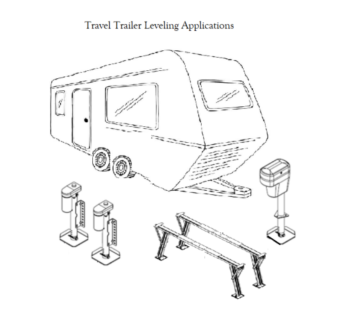A travel trailer self-leveling system automatically adjusts your trailer to ensure it stays level on uneven ground. This enhances stability and comfort.
Travel trailers offer the freedom of the open road, but uneven terrain can be a challenge. A self-leveling system solves this problem effortlessly. It uses advanced sensors and hydraulic or electric mechanisms to adjust the trailer’s position. This ensures a stable and comfortable living space, no matter where you park.
These systems are user-friendly, often controlled by a simple push of a button. Investing in a self-leveling system can save you time and effort, allowing you to enjoy your travel adventures without the hassle of manual leveling.
Types Of Self Leveling Systems
Travel trailers make camping trips comfortable and enjoyable. A crucial feature for travel trailers is a self-leveling system. This system ensures your trailer is stable on uneven ground. There are mainly two types of self-leveling systems: Hydraulic Systems and Electric Systems.
Hydraulic Systems
Hydraulic systems use fluid pressure to level your trailer. These systems are powerful and can handle heavy loads. They provide quick and precise leveling. Below are key features of hydraulic systems:
- Powerful: Can lift heavy trailers easily.
- Quick Operation: Levels the trailer in a short time.
- Precision: Offers accurate leveling for stability.
Hydraulic systems often come with manual controls. Some advanced models also have automatic leveling features. These systems are durable but may require regular maintenance.
Electric Systems
Electric systems use electric motors to level your trailer. These systems are generally easier to install and use. They are also quieter compared to hydraulic systems. Key features of electric systems include:
- Ease of Installation: Simple to install and set up.
- Quiet Operation: Produces less noise while leveling.
- Low Maintenance: Requires minimal upkeep.
Electric systems often come with remote controls for convenience. They are suitable for lighter trailers. Electric systems may not be as powerful as hydraulic ones but are highly user-friendly.
Below is a comparison table to help understand the differences:
| Feature | Hydraulic Systems | Electric Systems |
|---|---|---|
| Power | High | Medium |
| Speed | Fast | Moderate |
| Noise | Loud | Quiet |
| Maintenance | Regular | Low |
| Installation | Complex | Easy |

Credit: balrvproducts.com
Key Features To Look For
Finding the right travel trailer self leveling system can make your trips smoother. Here are the key features to look for. These features ensure stability and ease of use. Let’s dive into the details.
Automatic Vs Manual
Automatic leveling systems offer convenience. They level your trailer with just a push of a button. This feature saves you time and effort.
Manual leveling systems require more work. You need to adjust the jacks yourself. This option might suit those who prefer more control.
Weight Capacity
Weight capacity is crucial. Check the system’s weight limit before buying. Ensure it can handle your trailer’s weight.
| System Type | Weight Capacity |
|---|---|
| Automatic | Up to 10,000 lbs |
| Manual | Varies |
Always match the weight capacity with your trailer’s weight.
Also, consider future upgrades to your trailer’s weight.
- Ease of Use: Automatic systems are user-friendly.
- Durability: Look for systems made of strong materials.
- Maintenance: Some systems require regular upkeep.
Choosing the right system ensures a hassle-free travel experience.
Installation Process
Installing a travel trailer self-leveling system can make camping easier. This guide will walk you through the installation process. Follow these steps to ensure your system works perfectly.
Tools Needed
Gather these tools before starting the installation:
- Drill
- Screwdriver
- Wrenches
- Level
- Tape Measure
- Safety Glasses
- Gloves
Step-by-step Guide
Follow this guide to install your self-leveling system:
- Park the Trailer: Park your trailer on a flat surface.
- Disconnect Power: Disconnect the battery and power sources.
- Find Mounting Points: Identify the mounting points on your trailer.
- Attach Brackets: Use the drill to attach the brackets to the mounting points.
- Install Leveling Legs: Attach the leveling legs to the brackets.
- Connect Wiring: Connect the wiring to the power source and control panel.
- Test the System: Power on and test the leveling system.
- Final Adjustments: Make any necessary adjustments to ensure proper leveling.
Now, your travel trailer self-leveling system is ready to use. Enjoy a stress-free camping experience with a perfectly leveled trailer.
Maintenance Tips
Keeping your travel trailer’s self-leveling system in top shape ensures smooth trips. Proper maintenance avoids unexpected breakdowns and costly repairs. Follow these tips to keep your system running well.
Regular Inspections
Conducting regular inspections is crucial for your self-leveling system. Check for signs of wear and tear. Look for any visible damage or leaks. Inspect the hydraulic fluid levels and top up if needed.
- Inspect hydraulic lines and connections for leaks.
- Check for rust or corrosion on metal parts.
- Ensure all bolts and nuts are tight.
Common Issues And Fixes
Knowing common issues helps in quick troubleshooting. Here are some typical problems and their fixes:
| Issue | Fix |
|---|---|
| Hydraulic fluid leak | Replace damaged lines or seals. |
| System not leveling | Calibrate the sensors or check for obstructions. |
| No power | Check the fuse or battery connections. |
Stay proactive with maintenance to avoid these issues.
By following these maintenance tips, your travel trailer’s self-leveling system will serve you well for years. Happy travels!
Cost Considerations
Travel trailer self-leveling systems offer convenience and stability. However, understanding the cost considerations is essential before making a decision. These systems have upfront costs and long-term savings that should be evaluated.
Initial Investment
The initial investment for a travel trailer self-leveling system can be significant. Prices range from $500 to $3,000, depending on the brand and features. Installation costs also vary, typically between $200 and $500. Here is a breakdown of potential expenses:
- Basic Systems: $500 – $1,000
- Mid-Range Systems: $1,000 – $2,000
- High-End Systems: $2,000 – $3,000
- Installation: $200 – $500
Consider the features you need. Advanced systems with remote controls or automatic functions cost more. Evaluate your budget and needs before purchasing.
Long-term Savings
A travel trailer self-leveling system offers long-term savings that can offset the initial costs. Here are some ways you save money over time:
- Reduced Wear and Tear: Proper leveling reduces stress on the trailer’s structure.
- Lower Maintenance Costs: Leveling prevents damage to the chassis and appliances.
- Fuel Efficiency: A level trailer improves aerodynamics, saving fuel.
Using a self-leveling system enhances comfort and safety, which are valuable benefits. It also saves time and effort, making your travels more enjoyable.
| Cost Aspect | Range |
|---|---|
| Basic Systems | $500 – $1,000 |
| Mid-Range Systems | $1,000 – $2,000 |
| High-End Systems | $2,000 – $3,000 |
| Installation | $200 – $500 |

Credit: ql-hydraulic.en.made-in-china.com
Top Brands
Travel trailer self-leveling systems make camping easy. They help you set up your trailer quickly and safely. Several brands offer these systems, each with unique features. Here are some top brands that stand out in the market.
Popular Choices
Several brands are popular among travelers. They offer reliable and efficient self-leveling systems. Below is a list of some top choices:
- Lippert Components – Known for its Ground Control 3.0 system.
- Bigfoot Leveling Systems – Offers robust hydraulic systems.
- Equalizer Systems – Popular for their automatic leveling systems.
- HWH Corporation – Known for both hydraulic and air leveling systems.
Customer Reviews
Customer reviews help in choosing the best self-leveling system. They give insights into real-world usage and reliability. Below is a table summarizing customer feedback:
| Brand | Model | Rating | Customer Feedback |
|---|---|---|---|
| Lippert Components | Ground Control 3.0 | 4.5/5 | Easy to install, highly reliable. |
| Bigfoot Leveling Systems | Bigfoot Hydraulic | 4.7/5 | Strong and durable, excellent support. |
| Equalizer Systems | Automatic Leveling | 4.6/5 | Fast leveling, user-friendly. |
| HWH Corporation | Hydraulic Leveling | 4.4/5 | Reliable, easy to operate. |
User Experiences
Travel trailer owners love sharing their experiences with self-leveling systems. These stories highlight both the successes and lessons learned. Understanding these experiences helps new users make informed decisions.
Success Stories
Many users have had great success with travel trailer self-leveling systems. Their stories offer valuable insights.
- John’s Camping Adventures: John enjoys camping with his family. His self-leveling system made setup quick and easy. He shares that it saves him time and effort.
- Mary’s Road Trips: Mary travels alone in her trailer. She loves how the system ensures stability. She feels safe and secure on uneven ground.
- Emily and Jake’s Experience: This couple often camps in remote areas. Their self-leveling system handles any terrain. They appreciate the convenience it provides.
Lessons Learned
Some users faced challenges with their self-leveling systems. They share these lessons to help others avoid similar issues.
- Proper Maintenance: Regular checks ensure the system works well. Neglect can lead to malfunctions.
- Understanding the System: Reading the manual is crucial. It helps in troubleshooting problems.
- Battery Life: The system needs power. Users learned to monitor battery levels carefully.
These user experiences provide valuable knowledge for anyone using or considering a travel trailer self-leveling system. The success stories inspire confidence, while the lessons learned offer practical advice.

Credit: ql-hydraulic.en.made-in-china.com
Frequently Asked Questions
What Is A Travel Trailer Self-leveling System?
A travel trailer self-leveling system is an automated system that levels your trailer. It uses hydraulic or electric jacks to ensure stability. This provides convenience and safety during camping.
How Does A Self-leveling System Work?
A self-leveling system uses sensors and jacks to automatically level your trailer. The sensors detect uneven surfaces. The jacks adjust to make the trailer level.
Is A Self-leveling System Worth It?
Yes, a self-leveling system is worth it. It offers convenience and safety. You save time and effort when setting up your trailer.
Can I Install A Self-leveling System Myself?
Yes, you can install a self-leveling system yourself. However, it requires mechanical skills and tools. It’s recommended to hire a professional for installation.
Conclusion
A travel trailer self leveling system ensures a smooth and hassle-free setup. It saves time and effort, enhancing your camping experience. Investing in this system brings stability and safety to your travels. Enjoy more time exploring and less time adjusting.
Upgrade your travel trailer today for a seamless adventure.
